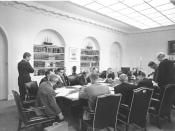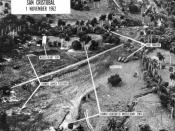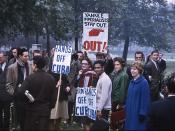The Cuban Missile Crisis
World War Two saw an unstable alliance between the East and the West in the war against Nazi Germany and later against Japan. The Atlantic Charter/Anglo-Soviet Treaty was signed on the 14th of August 1941. It was an unsteady alliance that was at times confusing and miss-interpreted on both sides, such as the Yalta meeting in February 1944, where the 'Big Three' met. Roosevelt hoped for reconciliation with the Communists, while Churchill wanted to stop the spread of Communism, even by imposing anti-Communist governments, while Stalin took more than he agreed to at the conference. At Bretton Woods in July 1994, near Washington DC, representatives met from both the Western block countries, aswell as from Russia, and the emerging communist state of China, to agree of the principals of the United Nations Charter. During the Potsdam conference after the war in Europe had ended, Truman hinted to Stalin that a 'super-weapon' existed, and this was the start of the Nuclear Arms race.
'Let us not be deceived', said veteran United States (US) political figure, Bernard Baruch, on 16 April 1947-one month after the promulgation of the Truman Doctrine with its aid to Greece and Turkey to resist alleged Communist aggression-'today we are in the midst of a Cold War' . Walter Lippman, noted US-syndicated columnist, used this phrase and it was immediately passed into common language to describe the relationship of the United States of America (USA) and the Soviet Union. The Cold War, which is said to have lasted from the end of World War II to the dismantling of the Soviet Union in 1991, was a tense political period between the Democratic and Communist blocs. The blocks being the East and the West, and most importantly, the United States and the Soviet Union. Although...


